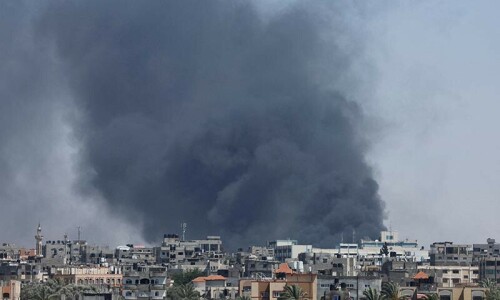
LAHORE: Local fertiliser manufacturing plants have been forced to shut down for over six months last year, causing shortage of this key input and subsequent price hike by whooping 141 per cent in just two years, claim the representatives of the industry.
Talking to newsmen here on Thursday they said that ill-conceived gas load management plan badly hampered manufacturing of urea and hence dealt a severe blow to agriculture sector.
Non-supply of gas to fertiliser sector is hurting farmers as well as agriculture sector besides causing maximum urea price hike. Higher input costs and lower produce prices have started crippling farming community. Fertiliser expenses saw the maximum increase among all inputs during last year. Within two years, urea prices increased by 141 per cent to Rs1,810 per bag from Rs750 per bag in December 2009. The government imposed two different type of taxes which includes 16 per cent GST and Gas Infrastructure Development Cess of 19 per cent.
Combined impact of both in current price is Rs384 per bag. Cess impact on urea manufacturers is Rs258 per bag without GST, however, industry passed on 50 per cent of this impact to the farmers. But the major price increase impact of Rs537 per bag was due to severe gas curtailment.
Despite Pakistan's current urea production capacity of 6.9 million tons, which is world's 7th largest, the country spent around $783 million on importing urea and the government had to give a subsidy of over Rs54 billion on imported urea.
Despite industry made an investment of $2.3 billion in last three years on new capacity, the country is sitting on an idle urea capacity of 2.0 million tons while urea is being imported spending precious foreign exchange.
Farmers are the real loser in this scenario where due to massive gas curtailments and ill planning in gas distribution, farmers had to face a loss of Rs127 billion on increased urea price in two years.
Manufacturing of fertiliser requires natural gas as feedstock raw material. The chemical composition of urea makes it impossible to use any alternative raw material. Based on this fact, fertiliser sector had been given priority for gas supply by the government after fulfilling the requirement of domestic consumers. This priority is clearly established in the ECC approved Gas Load Management Policy 2005 as well.
All fertiliser manufacturing concerns have signed a Gas Sale/Purchase Agreement (GSPA) for supply of natural gas to their respective plants for production of fertiliser. The GSPA is for a 12 month supply of an agreed quantity of gas.
On the contrary, gas supply to the fertiliser sector gets cut off while General Industrial Consumers, with only 9-month GSPA, are being provided gas even in winters for 4 days a week. This is a blatant violation as the 9-month GSPA does not include winter gas supply.













































Dear visitor, the comments section is undergoing an overhaul and will return soon.